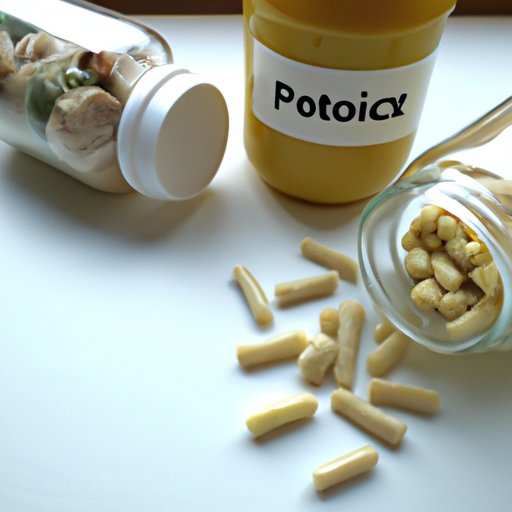Introduction
Probiotics are beneficial microorganisms that can help promote digestive health and overall wellness. They are naturally found in certain foods and can also be taken as supplements. But how many probiotics should you take per day? In this article, we’ll explore the recommended daily dose, factors to consider when determining the right amount, and the different types of probiotics and their benefits.
How Many Probiotics Should You Take Per Day?
The amount of probiotics you should take per day depends on your individual needs. According to the National Center for Complementary and Integrative Health (NCCIH), it is recommended that adults take a minimum of 1 billion colony forming units (CFU) of probiotics per day. However, some studies suggest that higher doses may be more effective. For example, a study published in the journal Nutrients found that taking 10 billion CFU of probiotics per day was associated with a greater improvement in digestive symptoms than taking 1 billion CFU per day.
In addition to the recommended dosage, there are other factors to consider when determining how much probiotics to take. These include your age, health conditions, lifestyle habits, and the type of probiotic supplement you are taking. It is important to speak to your healthcare provider before starting a probiotic supplement to ensure that it is appropriate for you.

The Benefits of Taking Probiotics and How Much to Take
Taking probiotics can provide a range of health benefits, including improved digestion and gut health. According to a systematic review published in the journal Nutrients, supplementing with probiotics has been shown to reduce bloating, improve stool frequency, and improve symptoms of irritable bowel syndrome.
In addition to improving digestive health, probiotics can also help boost the immune system, reduce inflammation, and reduce the risk of certain diseases. A meta-analysis published in the journal Frontiers in Nutrition found that taking probiotics was associated with a reduced risk of respiratory infections, such as colds and flu.
There are many different types of probiotics available, each with its own unique set of benefits. Common types include Bifidobacterium, Lactobacillus, and Saccharomyces boulardii. When selecting a probiotic supplement, it is important to read the label carefully to ensure that it contains the right strains of bacteria for your needs.

Exploring the Different Types of Probiotics and Their Benefits
Bifidobacterium is a type of beneficial bacteria that helps maintain a healthy digestive system. According to a systematic review published in the journal Gastroenterology Research and Practice, supplementing with Bifidobacterium has been shown to reduce abdominal pain and improve stool frequency in people with irritable bowel syndrome.
Lactobacillus is another type of beneficial bacteria that can help promote a healthy digestive system. A systematic review published in the journal World Journal of Gastroenterology found that supplementing with Lactobacillus was associated with a reduction in abdominal pain and bloating in people with irritable bowel syndrome.
Saccharomyces boulardii is a type of yeast that is often used to support digestive health. A systematic review published in the journal BMC Gastroenterology found that supplementing with Saccharomyces boulardii was associated with a reduction in diarrhea, as well as improvements in other digestive symptoms.
Understanding the Health Benefits of Taking Probiotics Regularly
Taking probiotics regularly can provide a range of health benefits, from improved digestion to a stronger immune system. However, it is important to choose a high-quality supplement that contains the right strains of bacteria for your needs. Speak to your healthcare provider before starting a probiotic supplement to ensure that it is appropriate for you.
It is also important to note that while probiotics can be beneficial, they are not a substitute for a healthy diet and lifestyle. Eating a balanced diet full of fruits, vegetables, whole grains, and lean proteins, as well as exercising regularly, can help support your overall health.
Conclusion
Probiotics are beneficial microorganisms that can help promote digestive health and overall wellness. The amount of probiotics you should take per day depends on your individual needs, but it is generally recommended to take a minimum of 1 billion CFU per day. There are many different types of probiotics available, each with its own unique set of benefits. Taking probiotics regularly can provide a range of health benefits, from improved digestion to a stronger immune system. However, it is important to choose a high-quality supplement and speak to your healthcare provider before starting a probiotic supplement.
(Note: Is this article not meeting your expectations? Do you have knowledge or insights to share? Unlock new opportunities and expand your reach by joining our authors team. Click Registration to join us and share your expertise with our readers.)
